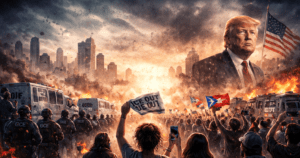As nuclear diplomacy between Iran and the United States reaches a critical juncture, a single word—enrichment—threatens to unravel years of painstaking progress. In a defiant declaration that could undermine ongoing negotiations, Iranian officials have warned that any American insistence on “zero enrichment” is a non-starter. The statement, delivered just days ago, signals not only a diplomatic impasse but also a deeper ideological divide between Tehran’s assertion of sovereign rights and Washington’s uncompromising stance on non-proliferation.
Iranian Deputy Foreign Minister Majid Takht-Ravanchi made it clear that the talks would “lead nowhere” if Washington insists on the complete cessation of uranium enrichment (Reuters). For Iran, enrichment has become not just a technical process but a symbol of national independence and scientific advancement. Supreme Leader Ayatollah Ali Khamenei echoed this sentiment, stating unequivocally that “we will not seek permission from anyone” for the continuation of Iran’s nuclear efforts.
U.S. Red Lines: Security and Zero Tolerance
From the American perspective, the stakes are equally high. The demand for zero enrichment is rooted in concerns that any Iranian capability, however limited, could be used as a stepping stone toward weaponization. Steve Witkoff, the U.S. Special Envoy on Iran, reiterated this policy direction, stating that Washington “cannot allow even one percent of enrichment capacity to remain.” The Biden administration’s earlier attempts to revive the 2015 Joint Comprehensive Plan of Action (JCPOA) were already met with resistance from Iranian hardliners; the current Trump administration’s more rigid approach is likely to further entrench opposition.
This zero-tolerance policy marks a definitive break from the JCPOA framework, under which Iran was permitted to enrich uranium up to 3.67% purity—suitable for civilian energy purposes but far below weapons-grade levels. The new U.S. position not only demands a rollback of existing capabilities but also seeks to establish a long-term ban, thereby resetting the baseline for future diplomatic engagement.
Strategic and Regional Ramifications
This diplomatic deadlock is more than a bilateral dispute; it carries significant geopolitical and security implications. Iran’s refusal to relinquish its enrichment program resonates across the region, particularly in Israel and the Gulf states, where concerns about Iranian intentions remain acute. Israeli Prime Minister Eli Cohen recently warned that “a nuclear-armed Iran is a red line not just for Israel, but for global stability.” The longer the standoff persists, the more likely it becomes that other regional actors will consider advancing their own nuclear capabilities, potentially igniting a regional arms race.
Furthermore, the uncertainty has already influenced global energy markets. Crude oil prices saw a notable uptick following the most recent statements from Tehran and Washington, as markets reacted to fears of escalating tensions and possible disruptions in oil supply routes.
A Final Note
Despite the stark rhetoric, diplomatic channels remain open. Iranian officials have indicated that they are reviewing a European-backed proposal for a fifth round of negotiations. However, the widening chasm between the two sides’ baseline positions raises doubts about whether meaningful progress can be achieved without a fundamental rethinking of red lines.
For any breakthrough to occur, both sides will likely need to adopt more flexible, phased approaches. This could include confidence-building measures such as enhanced IAEA inspections, time-bound limits on enrichment levels, or economic incentives in exchange for verifiable compliance. Without such innovations in diplomatic design, the current impasse risks hardening into a long-term strategic standoff.
















